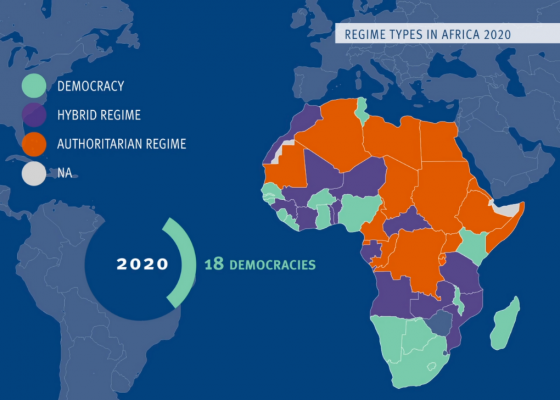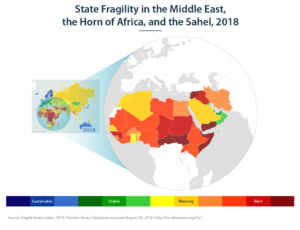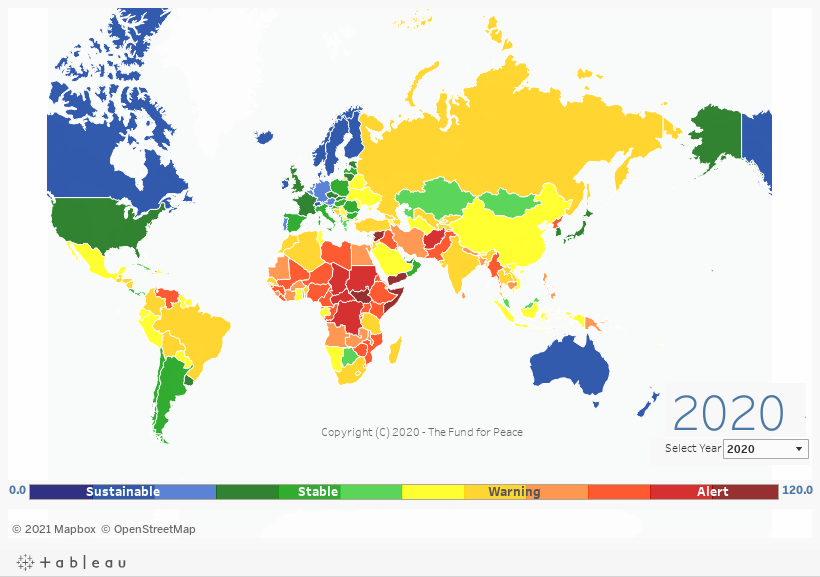 The COVID pandemic preyed more on weaker democracies and fragile states while political systems with strong rule of law and separation of powers have proved more resilient, notes the new International IDEA report (above), The Global State of Democracy 2021: Building Resilience in a Pandemic Era.
The COVID pandemic preyed more on weaker democracies and fragile states while political systems with strong rule of law and separation of powers have proved more resilient, notes the new International IDEA report (above), The Global State of Democracy 2021: Building Resilience in a Pandemic Era.
Fragile, new democracies have experienced worrying reversals, it observes:
- Armenia’s conflict with its authoritarian neighbor, Azerbaijan, in Nagorno-Karabakh,
and a military rebellion in early 2021, added strain to a fragile democratization process… - Mali held challenged elections in 2020, when parts of the country were barred from voting due to jihadist insurgencies, and the leader of the opposition was kidnapped a few days before election day….
- In Myanmar, which has been embarked on a fragile democratization path since 2015, the military used false claims about a rigged election to justify a coup in February 2021…
- The democratic process has also been disrupted in Tunisia in July 2021—the only democratic success story emerging from the Arab Spring—……

Credit: USIP
The Biden administration’s forthcoming Summit for Democracy underscores its commitment to reinforcing democracy, human rights, and governance, but recent events in Afghanistan, Sudan, and beyond have laid bare the difficulty of building up democratic societies in conflict-affected states in particular, the Carnegie Endowment observes.
The main lesson to draw from the last twenty years of policy interventions in Afghanistan is the failure of an overly superficial notion of democracy support and counterproductive security strategies, according to a new analysis.
While the U.S. government often approaches democracy support as a separate initiative from efforts to mitigate and stabilize conflicts, these two goals often overlap on the ground. What have we learned from these experiences? How should the United States approach issues of democracy in its implementation of the Global Fragility Act? Carnegie asks. A discussion co-sponsored with the International Republican Institute discusses lessons learned on democracy support in conflict-affected contexts and how to formulate a new playbook to assist democracies in fragile settings.
Democracy Support in Hard Places: Can We Do Better?
 Opening Remarks: Uzra Zeya is the under secretary for civilian security, democracy, and human rights at the U.S. Department of State. From 2019 to 2021, she served as president and CEO of the Alliance for Peacebuilding, a nonpartisan global network of more than 130 organizations working in more than 180 countries to end conflict by peaceful means.
Opening Remarks: Uzra Zeya is the under secretary for civilian security, democracy, and human rights at the U.S. Department of State. From 2019 to 2021, she served as president and CEO of the Alliance for Peacebuilding, a nonpartisan global network of more than 130 organizations working in more than 180 countries to end conflict by peaceful means.
Speakers: Rebecca Hamilton is an associate professor of law at American University Washington College of Law and has spent her career working on atrocity prevention. Aarya Nijat is the program officer for the Center for International Private Enterprise’s programs in South Asia, with a thematic focus on democratic governance, anticorruption, enterprise ecosystems and business advocacy. Patrick Quirk is the senior director for strategy, research, and the Center for Global Impact at the International Republican Institute (IRI). Scott Worden is the director of Afghanistan and Central Asia Programs at the U.S. Institute of Peace. He has an extensive background in reconstruction, development, democracy and governance, and public policy. Moderator: Frances Brown is a senior fellow and co-director of Carnegie’s Democracy, Conflict, and Governance Program, who previously worked at the White House, USAID, and in nongovernmental institutions. December 3, 2021. 1:00 to 2:15 p.m. EST Live Online. RTWT
 Fragility Forum 2022 Focus
Fragility Forum 2022 Focus
The seminal 2011 World Development Report (WDR) on Conflict, Security and Development furthered our understanding of key factors of peace and stability. As complexity and uncertainty become the new normal, the World Bank Fragility Forum 2022 will explore how the international community can best support countries affected by fragility, conflict and violence in a dramatically changing global landscape. For the selection of sessions, the Call for Proposals is now open until November 29, 2021, and Forum registration will open in November 2021. March 7-18, 2022, Washington, D.C. and online.
US response to 9/11 included peacebuilding through democracy promotion, but would such an approach work in future foreign policy implementation, @StanfordCDDRL asks https://t.co/NIonbmNTQo via @YouTube
— Democracy Digest (@demdigest) November 23, 2021







